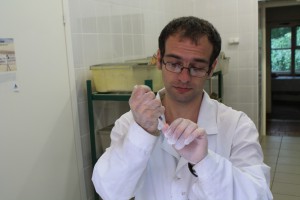There is the impression that laboratory scientists do their work in isolation, plodding through their experiments uninterrupted. It is often overlooked that to maintain a controlled experimental environment, researchers accept some chaos in their own lives. After a few months working at the Institute of Experimental Medicine in St. Petersburg, Russia on my Fulbright project to investigate the effect of early life exposure to stress on behavioral development in a rodent model, I realized how similarly laboratories in Russia and in the United States function. To collect all the data during our narrow time points, we borrowed labor from other laboratories to be paid back in the future. We shared materials to be returned on pain of death. Our experiments started at 5:00 p.m. sharp to take into account the daily rhythm of stress hormone – the rats have outsized influence on our schedules. Five of us created an assembly line, and hurried at each step not be late for the next. Meticulous planning and troubleshooting preceded the harried action of the experimental day. Although there were many languages spoken, one sentiment was shared: “don’t blow it, or wait six months to repeat the experiment.”
Science research is a fundamentally collaborative activity, and that is why a laboratory-based project proposal is well-suited for a Fulbright grant. Successful Fulbright proposals have an element of community engagement. I became interested in the Institute’s research at a conference, where I also learned about its famous history. The Physiology Department of the Institute includes Ivan Pavlov’s preserved office to commemorate the location where he conducted his groundbreaking conditioning experiments. One of his students discovered that the immune system could be conditioned to overreact to innocuous substances, using the principles of Pavlovian conditioning. Although performed in the 1920s, these experiments were not well regarded in the United States until 50 years later when they were revisited at the University of Rochester. If Soviet and American scientists had worked together over those 50 years to reconcile their different experimental approaches, progress would have proceeded more quickly.




